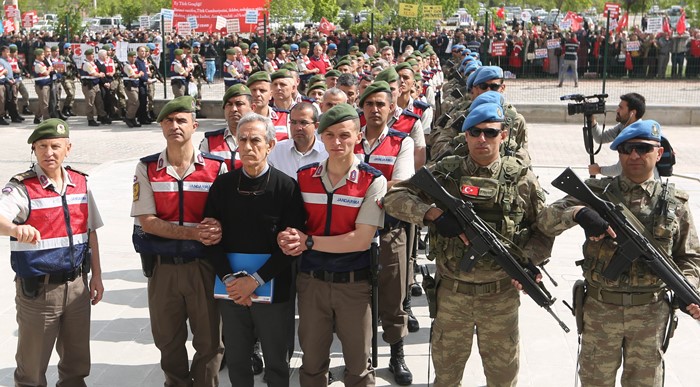The Supreme Court of Appeals of Turkey has upheld consecutive life sentences for 17 defendants who were alleged members of a military junta that attempted to topple the government in July 2016, the state-run Anadolu news agency reported.
The 3rd chamber of the court upheld the 138 consecutive life sentences handed down to the 17 alleged members of the Peace at Home Council who were to govern the country had the coup attempt been successful.
Turkey survived a coup attempt in 2016 that killed over 250 people and wounded more than a thousand others. Immediately after the abortive putsch, the government along with President Recep Tayyip Erdoğan pinned the blame on the faith-based Gülen movement. The movement strongly denies any involvement in the coup attempt.
Turkish-Islamic scholar Fethullah Gülen, whose views inspired the movement, is cited as the prime suspect in the indictment, while former commander of the Turkish Air Forces retired Gen. Akın Öztürk is listed as the second suspect.
The defendants were handed down the sentences by the Ankara 17th High Criminal Court in June 2019.
In addition to Öztürk, former generals Kubilay Selçuk, Mehmet Dişli, Hakan Evrim, Erhan Caha, Mehmet Partigöç and Ali Osman Gürcan; former rear admirals Ömer Faruk Harmancık and Sinan Sürer; and former colonels Bilal Akyüz, Cemil Turhan, Fırat Alakuş, Ahmet Özçetin, Murat Koçyiğit, Orhan Yıkılkan, Osman Kılıç and Muhsin Kutsi Barış were handed down the sentences on various charges including the “violation of the constitution” “an assassination attempt against the president” and “murder.”
Öztürk, who denies any involvement in the coup, came to public attention one day after the coup attempt, on July 16, 2016, with photos showing him and other military officers having been battered. There were apparent wounds on his face and body and drops of blood on his T-shirt caused by the maltreatment he was subjected to due to his alleged involvement in the coup attempt.
The former general said in his defense to the court in March 2019 that a plot was staged against him on the night of the failed coup to portray him as the leader of the abortive putsch.
Öztürk said he first heard the word “coup” on that night from then-chief of general staff Gen. Hulusi Akar, who told him to convince the putschist officers not to stage a coup.
He said he talked to the officers several times but that his efforts to stop the coup were futile.
The former general also talked about the acts of maltreatment he was subjected to while in detention, saying he was subjected to violence and humiliation by male and female police officers and soldiers until blood came out of his ears.
The rebel military officers who attempted to stage the coup called themselves the “Peace At Home Council,” in a declaration they had delivered via state-run broadcaster TRT on the night of the coup. The name was a reference to “Peace at home, peace in the world,” a famous saying of Mustafa Kemal Atatürk, the founder of the Republic of Turkey.
The coup attempt, whose 8th anniversary was marked on Monday, was suppressed overnight, and there remain many questions about the real masterminds of the abortive putsch, with conflicting statements from the government and those accused of involvement in the putsch.
It is known to have taken place outside the chain of command. Then-chief of general staff Gen. Akar was held hostage by the coup plotters for hours. There is widespread suspicion that Akar was involved in the coup and had prior knowledge of it. He was later promoted to defense minister.
Öztürk also said in his defense that, contrary to the government narrative, Akar was treated with respect when he was held captive by putschist officers at Akıncı Airbase in Ankara, the alleged headquarters of the putschists, on the night of the coup attempt.
Justice Minister Yılmaz Tunç, who revealed statistics last week about coup-related trials and investigations before the coup’s anniversary, said 289 trials in which defendants were actively involved in the coup attempt have been concluded so far and that the convictions had been upheld by the Supreme Court of Appeals in 206 of them as of last week.
He said a total of 4,891 people have been convicted in the trials, with 1,634 of them receiving aggravated life sentences, 1,366 sentenced to life in prison and 1,891 of them receiving sentences of various lengths on coup-related charges.
Courts acquitted 2,870 of the defendants in these trials, while deciding not to hand down any sentences to 964 of them, according to Tunç.
He put the number of people investigated thus far on terrorism or coup-related charges due to their alleged links to the Gülen movement at a staggering 705,172.
Tunç said there are currently 13,251 people in prison who are in pre-trial detention or convicted of terrorism in Gülen-linked trials.
Tens of thousands of people who were arrested in the post-coup crackdown and convicted of terrorism have been released from prison over the years after serving their sentences.
Following the coup attempt, the Turkish government launched a large-scale crackdown across the country on the media, public servants, judges, prosecutors and teachers, along with rebels within the army. The detentions, arrests and massive purges that followed the crackdown increased after a state of emergency was declared on July 20, 2016 concentrating power formally in the hands of the president by allowing him and his cabinet to make laws by fiat.
